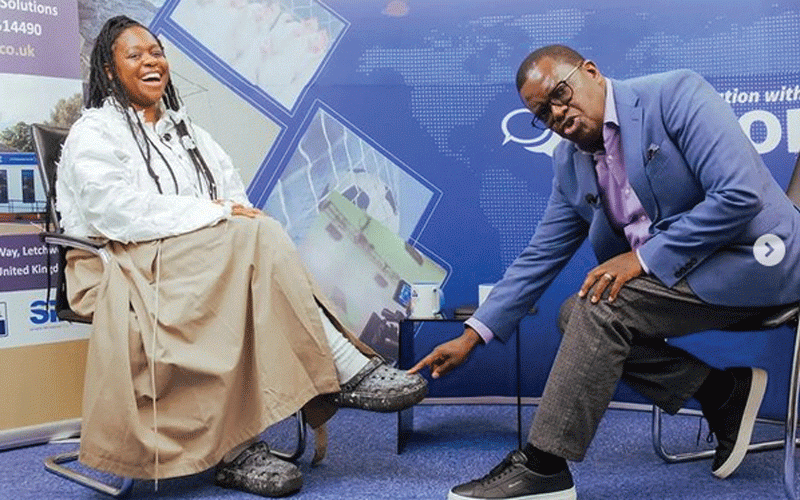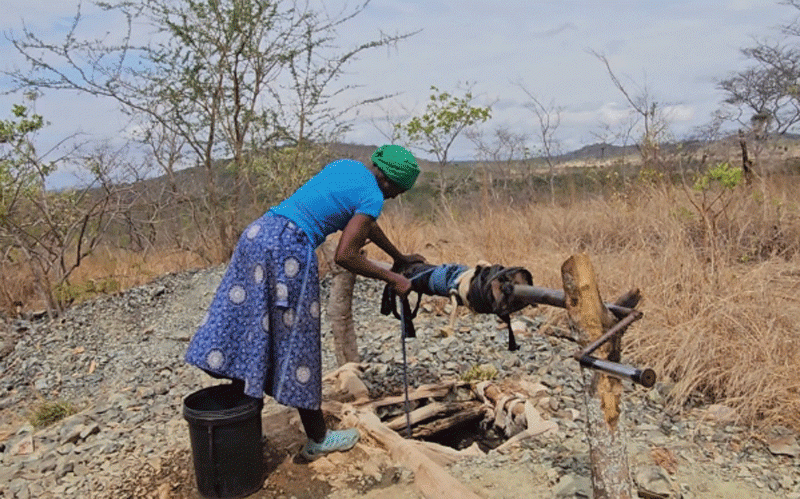
United Kingdom-based creative technologist Chipo Mapondera says Zimbabwe has a vibrant creative landscape that is being spurred by young people who appreciate their African heritage. Mapondera (CM) spoke about her work on the platform In Conversation with Trevor UK series hosted by Alpha Media Holdings chairman Trevor Ncube (TN).
Below are excerpts from the interview.
TN: Today, I'm in conversation with Chipo Mapondera, a creative technologist. You are watching the UK series brought to you in partnership with the Nyaradzo Group.
Chipo Mapondera, welcome to In Conversation with Trevor.
CM: Thank you so much for having me. I'm so glad to be here.
TN: I'm so excited to have you here. I'm looking at the way you are dressed and there's a story being told here, top to bottom.
Shall we go there? You are a fashion person, talk to me about the shoes.
- Zim’s creative landscape vibrant, says Mapondera
Keep Reading
CM: So the shoes are by a local designer, Mucheno Afro.
His name is Nomuza, just in his early 20s, like super hard-working, really great people person, sort of customer relations type of person and incredibly creative in what he creates, you know.
TN: And the top? So go ahead, you met him? Let’s talk about him.
CM: I met him at one of the most pioneering fashion events in Zimbabwe called the Fabric Party, that's done by Uleni OkaNdlovu.
It's on annually and it's just growing and growing.
It’s a fantastic platform for local fashion and creativity and yeah, we met there and because I'm in fashion…
I have worked in fashion internationally) in South Africa, in France, in the UK and you know, I'm just so interested and excited about what's happening locally.
Nomuza made this jacket as well.
There’s so much that's coming out from Zimbabwe that's leading, that's even more fashionable than what we are seeing here.
When I'm dressed in my Zim clothes in London, at all these fashion events and stuff, people are like, what are you wearing? ‘I'm like, it's from Zimbabwe.
So I'm working on having just an all Zim wardrobe basically.
TN: And the rings?
CM: The rings were done by Vaishali Naran, another Zimbabwean.
So, we went to high school together and again, she's an incredible maker.
She has learnt a lot about jewellery, about the craft of jewellery, even about stones, cutting stones in all the highest places all over the world from South Africa to America and now she' is based in the UK, really making her mark.
TN: Why do you feel you should support the local designers?
CM: Firstly, because they're making amazing things, amazing quality, amazing creativity.
I wouldn't wear it if it wasn't a great product and because it's something new.
I think that there's a huge interest in what's happening on the African continent as a whole.
I'm seeing that through my work as well, I'll tell you more.
It’s a young population, we're just newly connected through technology and we are expressing ourselves, we're expressing our heritage, we're expressing our contemporary lives and we are expressing it authentically and there's nothing like it out in the world, right?
It's our superpower. Exactly and I'm all about originality and authenticity.
TN: That's interesting because, coming from your generation, because, I think for some of us, my generation, your dad, John Mapondera and I, we were seduced into Western fashion but you young people are all about this authentic stuff.
Where does it come from particularly for you?
CM: I have had a Western and international education, even our private Zimbabwean education, it's British.
And then came to university in the UK and America and other countries and learned so much of European history, European culture.
I can talk to you about French and European art architecture.
I know that but then you're always trying to fit into something else, you're always trying to like to prove yourself and because of the type of career that I wanted, I wanted to be at Vogue,
I had to work so hard to prove myself like I deserve to be here too.
I have done that and it was really fun.
I learned so much, but now I'm more interested in carving out my own niche, working for myself, making my own legacy.
So I think the only way to do that is with authenticity.
TN: Is there a sense of what you've experienced with the struggle of wanting to fit in and not being fully accepted, is that a factor why this authenticity becomes such a strong thing?
CM: I wouldn't even look at it from a limiting point of view. I don't want it to come across like I was like begging for opportunities or wanting to be accepted, no, because I always grew up knowing like I come from this family and this is what we represent.
So I know that I deserve to be anywhere and I just wanted certain opportunities and I got them, but of course there are things that you have to consider like visas.
You have to work hard to overcome those kinds of things, but I've never come to look at it as a point of weakness at all.
I spent the pandemic in Zimbabwe after leaving like 15 or so years ago and not being in Zimbabwe for a long time, you know just short holidays and it just reopened my eyes.
The creative landscape in Zimbabwe was really interesting.
I just watched it a little bit over the past couple of years and then started creating it virtual, like combining my creativity with technology and yeah something just emerged and it's expanding.
TN: Did it emerge during that Covid-19 space?
CM: I think it did because I think we had a lot of time to reflect right, it was a reset in a way and actually at the beginning of Covid-19 I was so devastated to be in Zimbabwe not like in a bad way but like I had just gotten my job at Net-A-Porter, the largest e-commerce company in the world.
I had just got my first job as a software developer and then I'm stuck in Zimbabwe and I'm thinking, it was just a switch in my mentality and seeing that I can always be working for someone for the rest of my life and thinking like that's the best thing I can do is to work at this company or work at that company or I can start doing something that's purposeful, that's making a positive impact in my own society and that's going to take much further.
So that's when that shift started to happen.
TN: I'm fascinated by the reset that comes from this very difficult place, Covid-19.
Were you thinking you've lost an opportunity, but something else opens up, amazing isn't it?
So you are working on two fascinating projects, the Futuristic Pagan and the Immersive Assembly, Dreams and Echoes and I'm fascinated by the fact that a young person like you is going into the space of our African beliefs and rituals.
CM: Also during the Covid-19 period, I would take long walks at the end of the day after work and I was listening to different podcasts and I came across this podcast called Journey Kwantu.
It’s actually a South African podcast and it's looking at African traditional culture, but through a South African lens.
I was just learning about some belief systems and also history, like learning about how colonial history sort of disrupted and broke down some of the things that helped us live in harmony, like either socially or environmentally and just also gave us that self-esteem and self-worth as a people.
TN: So, break it down to us in terms of what Futuristic Pagan is all about.
CM: So Futuristic Pagan is a project that I co-created with Sabina Muchati.
Sabina is a fashion designer and a visual artist in her own right, and incredibly creative, visionary as well.
So I met her when I went to visit Zimbabwe.
She showed me some of her work, and I went to see her to ask her to design some clothes for me, and we were like, okay, we're going to do that, and then a couple of weeks later, Kombo Chafika, who's a local artist and also somebody who's really working with different technologies...
I had also met him at the fabric party, and he sent me an open call for the Design Futures Lab, an initiative to expose young Africans to new technologies, immersive technologies, and you needed someone with a tech background and someone with a fashion background.
So I said, Sabina, let's do this, and we had just been talking about our personal lives, our personal journeys. This was soon after the pandemic.
- This United Kingdom series of “In Conversation With Trevor” is brought to you in partnership with Nyaradzo Group. “In Conversation With Trevor” is a weekly show broadcast on YouTube.com//InConversationWithTrevor.









